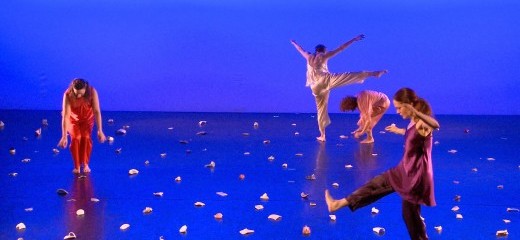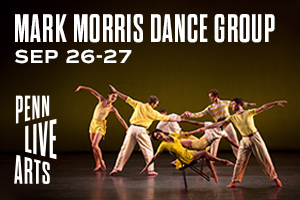
On Aging and Endings: Zero to Sixty
by Kalila Kingsford Smith
Framed as a tribute to Hellmut Gottschild, founder of ZeroMoving Dance Company (and one of the co-founders of Group Motion), Zero to Sixty: An Evening of Dance, Music & Memories features choreography and performance from former company members about aging, loss, and end of life. Gottschild, now 83, who led ZeroMoving between 1972 and 1993, sits in the front row of the Performance Garage. I am notably the youngest in the house, and I am curious to witness his impact on Philadelphia dance.
In Swantown: A Place Where Shit Life Happens, the narrator introduces a society of “swans” wearing thin white boas. This society includes messenger swans, a clunky variation on the four cygnets, Tess Tickle, a psychic drag-fairy swan, played by Paul Struck, and Chordata, played by Lisa Bardarson* (also the creator of this sketch). After Chordata’s malfunctioning body gets “recalled” by the cygnets, Death visits, wearing his all-black robe. Tess Tickle appears, helping Chordata strip down to a nude unitard, saying, “You have to go out the way you came in. It’s very modern.” I chuckle at this—Chordata indeed looks “modern” in her unitard and bare feet, lunging, spinning, and contracting to the well known Camille Saint-Saens composition. Reaching her arm up in a last grasp for life, this Dying Swan collapses in a heap. While Swantown feels like a too-long set-up for this punchline, in the end it is beautiful, and I appreciate the re-contextualization of a variation that so often stands alone.
Many of the choreographers pair set design, spoken text, and live music with dance to bring it new meanings. Renee Banson thumps her chest and staggers downstage in From Midnight to Dawn, as narrator Carol Florence dramatically reads aloud about dying. In I was and I am, Sheila Zagar sits in a chair flipping pages of a photo book; Bardarson and Tim Early dance the twist behind her. Later, Zagar presses through the air as if entering her own memories, dancing with the younger performers. A deep and authentic smile shines on her face before she returns to her empty chair and photo book. Her solitude in her age hits my chest like a rock.
In Harbour, Terry Beck faces a number of clocks that lay against a boat. A foghorn blares. He holds a clock. A recorded voice speaks, “My story begins simply. I could speak and I was happy.” Sudden little movements come from nowhere—hand across mouth, turn, arm slice, reach up. “It has come to seem there are no perfect endings. Or perhaps, once one begins, there are only endings.” He slowly approaches the boat, and climbs in. A final foghorn sounds, and he looks back, reaching into the darkness.
I am most fascinated by Bits of Broken Glass and Fine China, choreographed by Christine Vilardo in 1980 and “revisited and revised with the wisdom and limitations that come with age.” Four dancers (Linda Caruso Haviland, Dawn Morningstar, Janet Pilla Marini, and Sarah Schlechter) begin peacefully, pouring water from one glass jug to another, making their way across the stage. Banson enters and sits with her granddaughter, Aliyah Shapiro, near a wide metal bucket. She lifts a plate from the bucket, as if inspecting it for dirt, then throws it back in, and it shatters. I jump in my seat, alert and surprised. These women are not delicate.
The quartet back up with wicker baskets, placing broken ceramic pieces on the stage. Humming a tune accompanied by flautist Roberta Goren, their voices crescendo as they pepper the space with these toe-stubbers. I do not mind the time it takes; I am captivated by this task. Once complete, they cover their eyes and walk across, carefully feeling for their next foot fall. One dancer, eyes open, runs along the diagonal, arms sweeping behind her. She reaches her leg into a balance before jumping from side to side, never landing on a broken bit. The others start to move with abandon, yet still precisely. I feel this work viscerally, prepared to cringe in case of a misstep. I only cringe once.
The long evening concludes with a group tribute to Gottschild—eight ZeroMoving members walk through the space, performing little phrases of his choreography pulled from their memories. I feel like I am witnessing a last hurrah, a final chance to bring the group together, a reunion of a community that has not gathered in years. I feel out of place, or rather, out of time. What is it to be introduced to something only after it has ended? How am I also involved in this choreographer’s legacy? “Perhaps,” as Beck’s Harbour states, “once it begins, there are only endings.”
*Lisa Bardarson is a former thINKingDANCE writer.
Zero to Sixty: An Evening of Dance, Music & Memories, Renee Banson, Lisa Bardarson, Terry Beck, Patricia Veit, Christine Vilardo, Edrie Ferdun, Performance Garage, Oct. 4-5
By Kalila Kingsford Smith
October 26, 2019







